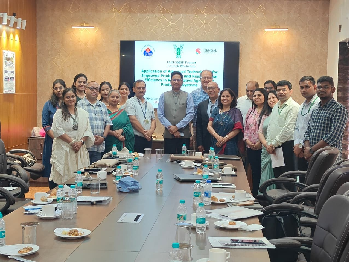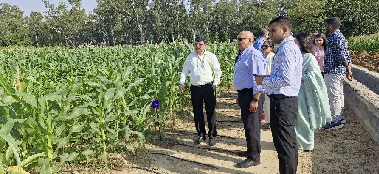15 September 2025, New Delhi
ICAR–Indian Agricultural Research Institute, New Delhi, in collaboration with the S M Sehgal Foundation (SMSF), Gurugram, formally launched a collaborative project on “Application of Advanced Technologies for Improved Productivity and Resource-use Efficiency in Regenerative Agriculture Production Systems” today. The event brought together eminent experts and stakeholders who shared their vision on the future of Indian agriculture and the role of regenerative technologies vis-à-vis automation enabled sub-surface-drip fertigation.

Padma Bhshan Dr. R. S. Paroda, President, Trust for Advancement of Agricultural Sciences and former Secretary, (DARE) & Director General, (ICAR), delivered the keynote address, emphasizing the urgent need to move from conventional intensive farming towards regenerative agriculture. He cautioned that factor productivity of key inputs, especially nitrogen and phosphorus fertilizers, is on the decline, threatening the long-term sustainability of Indian agriculture. Reflecting on the success of the Green Revolution, which made India self-sufficient in food production, he highlighted that the next revolution must restore natural resources and improve input-use efficiency. Drawing examples from the soybean–corn system of the USA, Dr. Paroda suggested that India must diversify from the rice–wheat system to alternatives, such as soybean–wheat or Arhar–wheat, which are more resource-efficient and sustainable.
Dr. Ch. Srinivasa Rao, Director and Vice-chancellor, ICAR-IARI (deemed to be University), focused on the twin challenges of climate change and water scarcity, calling them the most critical issues for Indian agriculture today. He highlighted the importance of enhancing resource-use efficiency and underscored the role of soil carbon management in achieving both productivity gains and environmental sustainability. He also emphasised the role of micro-irrigation in general and subsurface drip fertigation in saving precious water and fertilizer resources while improving crop yields and soil environment, and reducing greenhouse gas emissions.

The event concluded with the formal launch of the project at the Division of Agronomy, research farm, marking the beginning of a partnership that aims to build climate-resilient and resource-efficient agricultural production systems for the future.
(Source: ICAR-Indian Agricultural Research Institute, New Delhi)








Like on Facebook
Subscribe on Youtube
Follow on X X
Like on instagram